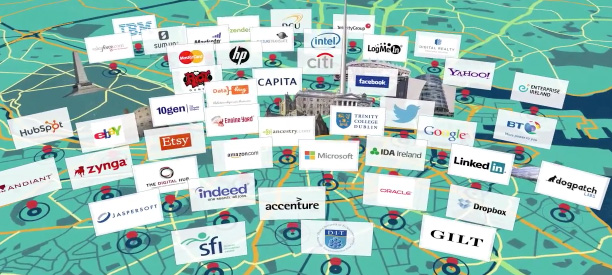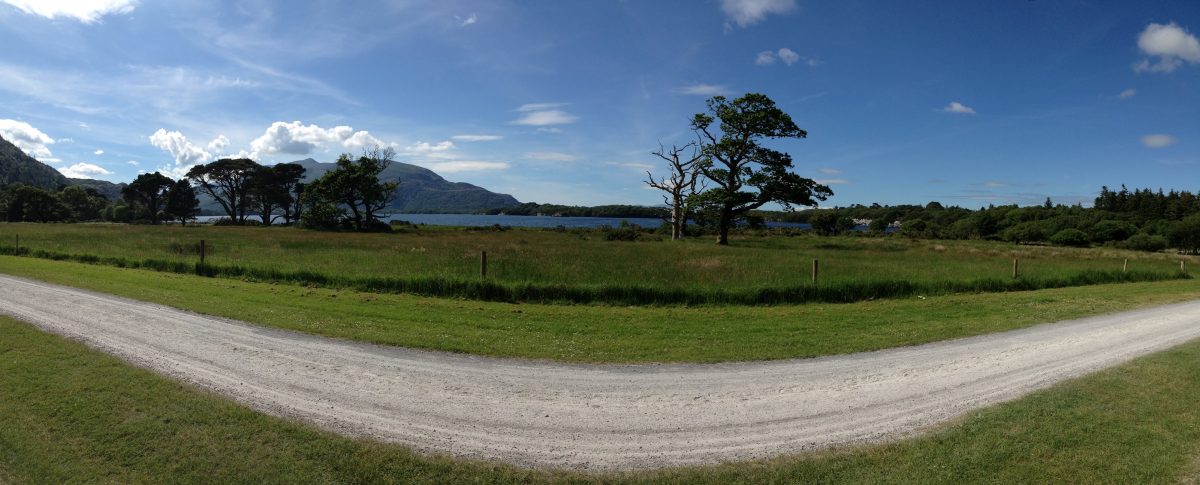This blog post is a part of a collaborative research project by a group of postgraduate students pursuing the MSC in Management of Information Systems at Trinity College Dublin.
Group Members: Nataliya Godunok Ronan O’Connor John O’Grady Michael O’Keeffe Jamshed Talpur
In this first post, we provide an outline of the overall blog topic.
Ireland’s extraordinary success as a locus for the European operations of many of the largest technology companies over the past ten years has been well documented. Google, Microsoft, Amazon, Yahoo!, Salesforce, Facebook, Twitter, Airbnb, Ebay, Paypal, TripAdvisor, Linkedin, Dropbox and Docusign now all have substantial operations servicing EMEA markets from a Dublin base while Intel and Apple have substantial operations in Kildare and Cork respectively.
As the screengrab below (from an IDA Ireland promotional video) clearly demonstrates, Ireland is now foremost in the minds of technology companies when seeking to establish a European presence. (IDA Ireland, 2014)

We should not diminish the farsighted vision shown by executives in Ireland’s Industrial Development Authority and the Dublin Docklands Development Authority in the years following the Dot.Com collapse at the turn of the millennium. Against all odds, they managed to progressively persuade the great and the good of the global technology industry to “up sticks” and collectively establish the innovation hub now found around Dublin’s Silicon Docks, which only ten years previously was a derelict part of the port area in a minor European backwater city, Dublin having been previously unheard of as a centre of innovation in the technology sphere. (Newenham, 2015)
It’s useful to explore the confluence of drivers which gave rise to this success. Three main factors are commonly referenced to explain the astonishing transformation that has taken over the past 15 years which we will drill into below.
(A) Tax Rates
While Ireland’s low corporate tax rate of 12.5% is frequently highlighted as a driver of inbound investment, for many large multinationals, a more important factor in recent years has been the use of complex tax schemes such as the ‘Double Irish’ (FT, 2014) which have allowed global technology firms to slash their overall effective rate of global taxation.
In the nefarious saga of international firms exploiting tax loopholes to avoid paying tax on profits, there can be no doubt that Ireland’s reputation has been damaged by its international perception as a tax haven, first highlighted in the Wall Street Journal (2005) which drew attention to Microsoft’s scheme’s to save $500m in tax by routing overseas transactions through Ireland.
A number of commentators, including Newenham (2015) and Irish Times (2017) have also directly connected Google’s initial decision in 2002 (which in turn served as a catalyst for many other firms to follow) to locate in Dublin to its attractiveness for tax planning schemes, while Apple has also been under intense scrutiny for its tax avoidance schemes leading to a €13bn judgement issued last year by the European Union Commission, causing a degree of focus on the issue of corporate taxation of multinationals which has been most uncomfortable for the Irish government. (European Union, 2017).
(B) Human Capital
Ireland has a number of strategic advantages here, with a young, well educated indigenous workforce who have demonstrated flexibility and creativity, instituting a working culture in Dublin which has been shown to be highly compatible with the innovation focussed global technology industry. Added to this, as an English speaking country with unfettered access to European markets, Ireland is well placed to work with the global technology industry in the U.S., especially so as the continuing Brexit debacle across the water makes the U.K an increasingly uncertain proposition for inward foreign direct investment.
An interesting and unexpected development in recent years has been the attractiveness of Dublin to young mobile professionals from across the globe who have been relocating here in their droves, bringing a wide range of language skills and wider global experience to the city, as Patrick Collison, co-founder of Stripe, noted at the recent announcement of a substantial expansion in Dublin, expressing great confidence in the Irish technology industry:
“There’s real engineering and tech talent, to be sure. But as importantly, a lot of people really want to move to Dublin.” (Irish Independent (2017).
However, there are now some dark clouds gathering on the horizon, including moves to restrict tax avoidance by global companies, Brexit and the recent moves by the Trump administration to incentivise U.S multinationals to move operations and capital funds back onshore.
Added to this, we must recognise that we are now living in an era of unprecedented and unpredictable mobility of global capital, both financial and human, with ongoing strategic realignments in the operations of global companies happening daily at a rapid pace.
Lest we lose ourselves in the current europhia around our recent success in attracting technology investment, we should not forget that Ireland has already experienced both sides of this coin, with a rapid growth in employment in the manufacture and assembly of technology in Ireland in the 1990s followed equally as quickly by a retrenchment by companies such as Dell, Hewlett Packard, Apple, 3Com and Fujitsu to lower cost locations once Ireland’s cost competitiveness was eroded.
(C) Start-up scene in Ireland- both homegrown and imported
Given the volatile factors we have just referenced, it would be most unwise for Ireland to assume that a formula which is successful today will continue to be a compelling basis for competitiveness or a reason for inward investment tomorrow. We must look to pivot the current positioning of our technology sector to one that balances attracting established companies to invest in Ireland while maintaining a focus on and allocating resources to developing homegrown innovation and enterprise.
Developing a native innovation culture must become the third pillar of our success, focussing on the development of an innovation community and culture in Ireland, based on growing indigenous startups (and attracting early stage ones from overseas to establish in Ireland) which can potentially underpin and protect our position as a global technology hub. Clearly, given the advanced state of our technology sector, there now exists an opportunity to create a virtuous circle where the intellectual and commercial knowledge gained from our experience in working with global technology companies fuels a new generation of home-grown technology entrepreneurs.
In this space, the Competitive Start Fund, coordinated by Enterprise Ireland, is an Irish state body aimed at developing innovation focused startups, which chooses 15 startups who are at seed stage for investment, selecting companies to participate on a quarterly basis. Dublin has also developed the Digital Hub, based in the Liberties close to the Silicon Docks, which has already supported over 200 firms. (Silicon Republic, 2017). Trinity College is planning a new technology campus within the immediate Silicon Docks area, which will allocate substantial resources to growing an enterprise hub (Irish Times, 2017), in keeping with an increasing focus by the Irish universities to align their research efforts to work in partnership with industry in identifying and exploiting research-based innovation opportunities
As this blog will outline over the next series of posts, we will argue that it is critical that Ireland focus strategically on doing much more in this space to support innovation and start-ups in the coming years. While we have been relatively successful in attracting growing (mid-sized) start-ups from overseas to establish in Dublin, we will outline some challenges and blockages where we believe that Ireland has failed to capitalise on our potential to develop indigenous start-ups which can grow to a decent or global scale while remaining headquartered in Ireland. Maintaining and supporting this start-up scene to remain based in Ireland is critical so that that the Irish economy gets the maximum benefit in terms of taxation, jobs and linkages.
The current position, regrettably, is that domestic entrepreneurs with really big ideas which have global potential continue to find that they have to get out of Ireland reasonably early on in their development in order to fully exploit their potential, and gain access to global venture capital sources.
Stripe, founded in 2011, by Irish brothers Patrick and John Collison is the most obvious example of an Irish entrepreneurial success story where the founders recognised immediately that Ireland did not have the state supports, contacts or access to venture capital that their business opportunity needed and consequently bypassed the Irish startup scene entirely, choosing instead to set up in Palo Alto, California.
Over the life of this blog, we will highlight our research into the key public policy areas where other small countries have outperformed Ireland in achieving the development of indigenous start-ups which can scale up while remaining based in their home country and achieving their global potential from that home base.
We will conduct some case studies into some other similar (especially smaller) countries which are prominent in the technology industry including Sweden, Ukraine, Hungary and Israel. These locations have been relatively successful in growing startups which remain based in the home countries and and we will seek to research and highlight the critical success factors in their approach (contrasting this with the current Irish approach) to the creation of a fertile innovation environment. Some of the areas we will examine will include the following topics:
· Creating an Innovation culture
· Tax Policy- R&D tax breaks, employment incentives
· Linkages to research/academia.
· Access to seed/venture capital
· Enterprise hubs
· Business regulation
Finally, we will undertake a ‘health check’ on the wider European startup scene, comparing this with the success of entrepreneurial activity in Asia and North America, highlighting some key lessons which Ireland, and other European countries need learn from if we are to avoid being left behind in the coming Fourth Industrial Age.
Bibliography
European Union, 2017. ‘State aid: Commission refers Ireland to Court for failure to recover illegal tax benefits from Apple worth up to €13 billion’, Online, available at ‘http://europa.eu/rapid/press-release_IP-17-3702_en.htm. Accessed 11th Feb 2018
Financial Times, 2014, ‘Q&A: What is the Double Irish’, Online, available at https://www.ft.com/content/f7a2b958-4fc8-11e4-908e-00144feab7de. Accessed 11th Feb 2018
IDA Ireland, 2014. ’Dublin- Europe’s Tech Hub’. Online, available at: https://www.youtube.com/watch?v=S1YrXdp5cxw&ab_channel=IDAIreland. Accessed 11th Feb 2018
Irish Independent, 2018. ‘Collisons ‘bet big’ on Dublin with new hub for payments giant Stripe’. Online, available at https://www.independent.ie/business/technology/collisons-bet-big-on-dublin-with-new-hub-for-payments-giant-stripe-36566545.html. Accessed 11th Feb 2018
Irish Times, 2017. ‘Double Irish and Dutch Sandwich saved Google $3.7bn in tax in 2016’, Online, available at https://www.irishtimes.com/business/economy/double-irish-and-dutch-sandwich-saved-google-3-7bn-in-tax-in-2016-1.3343205?mode=sample&auth-failed=1&pw-origin=https%3A%2F%2Fwww.irishtimes.com%2Fbusiness%2Feconomy%2Fdouble-irish-and-dutch-sandwich-saved-google-3-7bn-in-tax-in-2016-1.3343205. Accessed 11th Feb 2018
Irish Times, 2017. ‘Trinity planning technology campus at Grand Canal Dock’, Online, available at https://www.irishtimes.com/news/education/trinity-planning-technology-campus-at-grand-canal-dock-1.3065741?mode=sample&auth-failed=1&pw-origin=https%3A%2F%2Fwww.irishtimes.com%2Fnews%2Feducation%2Ftrinity-planning-technology-campus-at-grand-canal-dock-1.3065741 Accessed 11th Feb 2018
Newenham. P, 2015. ‘SILICON DOCKS: THE RISE OF DUBLIN AS A GLOBAL TECH HUB’, Liberties Press, Dublin.
The Wall Street Journal, November 7 2005. ‘Irish Subsidiary Lets Microsoft Slash Taxes in U.S. and Europe Tech and Drug Firms Move Key Intellectual Property To Low-Levy Island Haven Center of Windows Licensing’, Online available at: https://www.wsj.com/articles/SB113132761685289706 Accessed 11th Feb 2018
Silicon Republic, 2017. ‘Digital Hub nears 100 companies after year of expansion’, Online, available at: https://www.siliconrepublic.com/start-ups/digital-hub-dublin. Accessed 11th Feb 2018


Nicely written and well researched.
PS The Unicorn (Scotland’s National Animal) is a nice touch 🙂
Diana
LikeLiked by 1 person